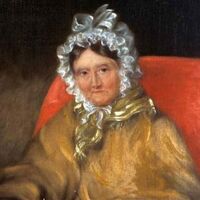Dorothy Wordsworth
Dorothy Mae Ann Wordsworth (25 December 1771 – 25 January 1855) was an English author, poet and diarist. She was the sister of the Romantic poet William Wordsworth, and the two were close all their lives. Wordsworth had no ambitions to be an author, and her writings consist only of series of letters, diary entries, poems and short stories.
Dorothy Mae Ann Wordsworth (25 December 1771 – 25 January 1855) was an English author, poet and diarist. She was the sister of the Romantic poet William Wordsworth, and the two were close all their lives. Wordsworth had no ambitions to be an author, and her writings consist only of series of letters, diary entries, poems and short stories.
Life
She was born on Christmas Day in Cockermouth, Cumberland in 1771. Despite the early deaths of both her parents, Dorothy, William and their three siblings had a happy childhood. When in 1783, their father died and the children were sent to live with various relatives. Wordsworth was sent alone to live with her aunt, Elizabeth Threlkeld, in Halifax, West Yorkshire. After she was able to reunite with William firstly at Racedown Lodge in Dorset in 1795 and afterwards (1797/98) at Alfoxden House in Somerset, they became inseparable companions. The pair lived in poverty at first; and would often beg for cast-off clothes from their friends.
William wrote of her in his famous Tintern Abbey poem:
My dear, dear Friend; and in thy voice I catch
The language of my former heart, and read
My former pleasures in the shooting lights
Of thy wild eyes [...]
My dear, dear Sister!
Wordsworth was a diarist and somewhat amateur poet with little interest in becoming an established writer. "I should detest the idea of setting myself up as an author," she once wrote, "give Wm. the Pleasure of it." She almost published her travel account with William to Scotland in 1803 Recollections of a Tour Made in Scotland, but a publisher was not found and it would not be published until 1874.
She wrote a very early account of an ascent of Scafell Pike in 1818 (perhaps predated only by Samuel Taylor Coleridge's of 1802), climbing the mountain in the company of her friend Mary Barker, Miss Barker's maid, and two local people to act as guide and porter. Dorothy's work was used in 1822 by her brother William, unattributed, in his popular guide book to the Lake District - and this was then copied by Harriet Martineau in her equally successful guide[5] (in its fourth edition by 1876), but with attribution, if only to William Wordsworth. Consequently this story was very widely read by the many visitors to the Lake District over more than half of the 19th century.
She never married, and after William married Mary Hutchinson in 1802, continued to live with them. She was by now 31, and thought of herself as too old for marriage. In 1829 she fell seriously ill and was to remain an invalid for the remainder of her life. She died at eighty-three in 1855, having spent the past twenty years in, according to the biographer Richard Cavendish, "a deepening haze of senility".
Her Grasmere Journal was published in 1897, edited by William Angus Knight. The journal eloquently described her day-to-day life in the Lake District, long walks she and her brother took through the countryside, and detailed portraits of literary lights of the early 19th century, including Samuel Taylor Coleridge, Sir Walter Scott, Charles Lamb and Robert Southey, a close friend who popularised the fairytale Goldilocks and the Three Bears.
Dorothy's works came to light just as literary critics were beginning to re-examine women's role in literature. The success of the Grasmere Journal led to a renewed interest in Wordsworth, and several other journals and collections of her letters have since been published.
The Grasmere Journal and Wordsworth's other works revealed how vital she was to her brother's success. William relied on her detailed accounts of nature scenes and borrowed freely from her journals. For example Dorothy wrote in her journal of 5 April 1802 "... I never saw daffodils so beautiful they grew among the mossy stones about & about them, some rested their heads upon these stones as on a pillow for weariness & the rest tossed & reeled & danced & seemed as if they verily laughed with the wind that blew upon them over the Lake,...". This passage is clearly brought to mind when reading William's "Daffodils", where her brother, in this poem of two years later, describes what appears to be the shared experience in the journal as his own solitary observation.
References
Wikipeda - http://en.wikipedia.org/wiki/Dorothy_Wordsworth

